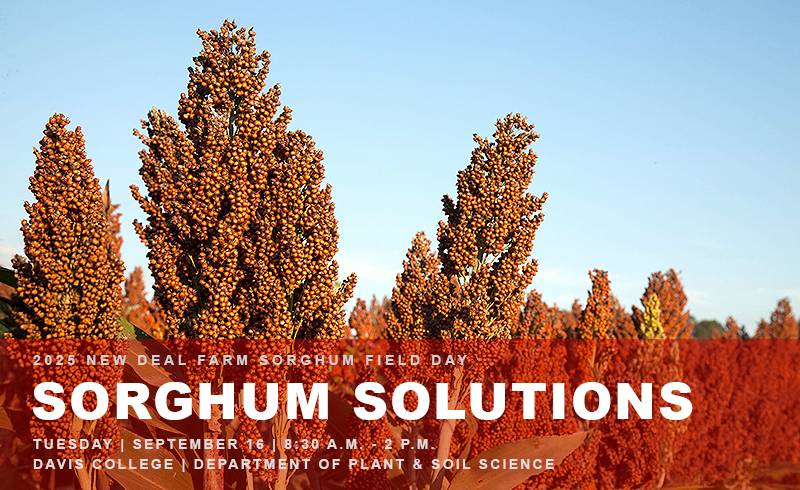
In the face of mounting challenges to agriculture across the South Plains, Texas Tech’s Department of Plant & Soil Science will host the 2025 New Deal Farm Sorghum Field Day on Monday (Sept. 22), drawing growers, scientists and industry leaders to one of the region’s major crops.

The program, held from 8:30 a.m. to 2 p.m. at a Davis College of Agricultural Sciences & Natural Resources research farm near New Deal, about a 20-minute drive northeast of campus, is free and open to the public. Lunch will be provided.
“Sorghum is a true resource conserving crops both in terms of water and nutrients and provides an excellent option to the cropping systems in the Texas High Plains,” said Krishna Jagadish, interim chair of the department as well as Professor and Thornton Distinguished Chair.
“Large scale inclusion of sorghum in rotation with cotton helps in improving soil health, sustainability and lower soil and nutrient erosion, having a game changing impact on our regional agriculture,” he said.”
The event will be led by Clint Krehbiel, dean of Davis College, alongside Tim Lust, chief executive of the National Sorghum Producers and the Sorghum Checkoff, two organizations representing more than 30,000 growers nationwide.
Speakers will present new findings on soil and crop management, genetic resources and cutting-edge imaging technologies. Topics include:
- Nano fertilizers in dryland systems
- Genetic studies in Pearl Millet
- Root resilience under nitrogen and water-deficit stress
- Trait-focused sorghum population development
- Early planting of forage sorghum
- Sorghum-cotton rotations with and without cover crops
- Machine learning for soybean flower prediction and root growth
- Heat stress effects on cotton yield and lint quality
- Genetic control of sorghum lodging
Jagadish, who has published nearly 200 peer-reviewed papers and secured close to $22 million in research funding, recently co-edited Designing Sorghum Genome for NextGen Agriculture with colleague Dinesh Saini. The book highlights how genetics, data science and crop modeling can drive productivity gains for sorghum under climate stress.
Davis College has become a national leader in sorghum research. In 2023, its scientists launched a $1.1 million USDA project under the Partnerships for Climate-Smart Commodities program, focused on tracking energy and water use to position sorghum as a sustainable crop for the region. The initiative builds on the Texas Alliance for Water Conservation, a long-running Texas Tech–led effort to extend the life of the Ogallala Aquifer, the largest underground freshwater reserve in the country.
The college also secured $1.6 million from the United Sorghum Checkoff Program for a multi-institutional effort with Texas A&M, Kansas State and USDA researchers. The United States remains the world’s top sorghum producer, harvesting roughly 454 million bushels last year.
CONTACT: Krishna Jagadish, Interim Chair and Professor, Department of Plant & Soil Science, Davis College of Agricultural Sciences & Natural Resources, Texas Tech University at (806) 834-7953 or kjagadish.sv@ttu.edu
0915NM25 | Editor’s Note: To find a map to the Davis College’s Research Farm at New Deal, please click here
